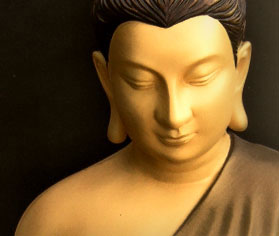Vegetarianism
From Ven. S. Dhammika
 There are differences of opinion between Buddhists on this issue so we will attempt to present the arguments of those who believe that vegetarianism is necessary for Buddhists and those who do not.
There are differences of opinion between Buddhists on this issue so we will attempt to present the arguments of those who believe that vegetarianism is necessary for Buddhists and those who do not.
Vegetarianism was not a part of the early Buddhist tradition and the Buddha himself was not a vegetarian. The Buddha got his food either by going on alms rounds or by being invited to the houses of his supporters and in both cases he ate what he was given. Before his enlightenment he had experimented with various diets including a meatless diet, but he eventually abandoned them believing that they did not contribute to spiritual development.
The Nipata Sutta underlines this point when it says that it is immorality that makes one impure (morally and spiritually), not the eating of meat. The Buddha is often described as eating meat, he recommended meat broth as a cure for certain types of illness and advised monks for practical reasons, to avoid certain types of meat, implying that other types were quite acceptable.
However, Buddhists gradually came to feel uncomfortable about meat eating. In 257 BC King Asoka said that in contrast to before, only two peacocks and a deer were killed to provide food in the royal kitchens and that in time even this would be stopped. By the beginning of the Christian era meat eating had become unacceptable, particularly amongst the followers of the Mahayana although the polemics against it in works like the Lankavatara Sutra indicates that it was still widespread or a least a point of controversy (see footnote in the previous section). Tantric text dating from the 7th and 8th centuries onward, frequently recommend both drinking alcohol and eating meat and both are considered fit to offer to gods. This was probably as much an expression of the freedom from convention which Tantra taught as it was a protest against Mahayanists to whom practices like abstaining from drink and meat had become a substitute for genuine spiritual change.
Today it is often said that Mahayanists are vegetarian and Theravadins are not. However the situation is a little more complex than that. Generally Theravadins have no dietary restrictions although it is not uncommon to find monks and lay people in Sri Lanka who are strict vegetarians. Others abstain from meat while eating fish. Chinese and Vietnamese monks and nuns are strictly vegetarian and the lay community try to follow their example although many do not. Amongst Tibetans and Japanese Buddhists, vegetarianism is rare.
Buddhists who insist on vegetarianism have a simple and compelling argument to support their case. Eating meat encourages an industry that causes cruelty and death to millions of animals and a truly compassionate person would wish to mitigate all this suffering. By refusing to eat meat one can do just that.
Those who believe that vegetarianism is not necessary for Buddhists have equally compelling although more complex arguments to support their view: (1) If the Buddha had felt that a meatless diet was in accordance with the Precepts he would have said so and in the Pali Tipitaka at least, he did not. (2) Unless one actually kills an animal oneself (which seldom happens today) by eating meat one is not directly responsible for the animal’s death and in this sense the non- vegetarian is no different from the vegetarian. The latter can only eat his vegetables because the farmer has ploughed his fields (thus killing many creatures) and sprayed the crop (again killing many creatures). (3) While the vegetarian will not eat meat he does use numerous other products that lead to animals being killed (soap, leather, serum, silk etc.) Why abstain from one while using the others? (4) Good qualities like understanding, patience, generosity and honesty and bad qualities like ignorance, pride, hypocrisy, jealousy and indifference do not depend on what one eats and therefore diet is not a significant factor in spiritual development.
Some will accept one point of view and some another. Each person has to make up his or her own mind.
REFERENCES:
- (1) Ruegg, D.S. “Ahimsa and Vegetarianism in the History of Buddhism” in Buddhist Studies in Honour of Walpola Rahula. S. Balasooriya,(et.al) London, 1980;
- (2) P. Kapleau, To Cherish All Life, London, 1982.
Source : Buddhanet.net




